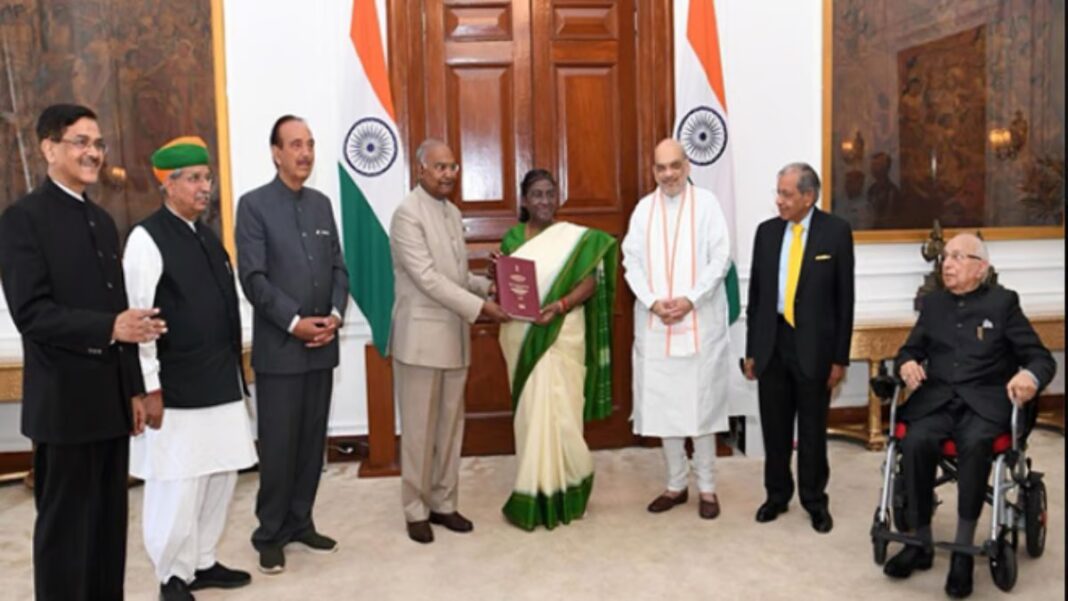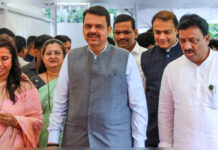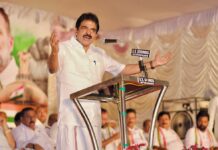X: @the_news_21
In 2014, the Bharatiya Janata Party (BJP) began advocating strongly for the concept of “one nation one poll” shortly after coming to power. The idea gained further traction in 2017 when it received support from the NITI Aayog, the apex public policy think tank of the Government of India. Prime Minister Narendra Modi reiterated his endorsement of simultaneous elections, emphasizing its importance in 2019.
Fast forward to March 14th, Thursday, and a significant step toward realizing this vision was taken as Former President of India, Shri Ram Nath Kovind, who heads the High-Level Committee (HLC) on ‘One Nation, One Election,’ presented the committee’s report to President Droupadi Murmu. Accompanying him were members of the HLC, including Union Home Minister Shri Amit Shah, Minister of State (I/C) for Law and Justice Shri Arjun Ram Meghwal, and former Chief Minister of Jammu and Kashmir Shri Ghulam Nabi Azad, among others.
The Significance of the One Nation One Poll Idea
India, with over 25 states, witnesses elections at different times as each state goes to polls after completing a stipulated period of five years. However, frequent dissolution of assemblies due to governments losing majority leads to staggered elections, disrupting the overall efficiency of the nation. This results in political leaders and ministers being preoccupied with election campaigns, while development projects often come to a halt due to election code of conduct. The concept of holding simultaneous elections for both parliamentary and state assemblies aims to address these issues, reducing costs and ensuring continuity in national progress.
Will All Elections Be Held on One Day?
While the idea is to synchronize Lok Sabha and state assembly elections, they will likely be staggered over a period of a month or more. This phased approach allows for the judicious utilization of resources by the Election Commission and security personnel. Voters will have the convenience of casting their votes for both parliamentary and assembly candidates simultaneously, streamlining the electoral process and minimizing disruptions.
As the nation embarks on this ambitious journey towards “one nation one poll,” careful deliberation and meticulous planning will be crucial in ensuring its successful implementation and realizing its potential benefits for India’s democratic fabric and governance efficiency.








generic clomiphene online can you buy clomid online where can i buy cheap clomiphene pill cost of clomiphene price clomid for sale in mexico where buy generic clomiphene generic clomiphene c10m1d
More posts like this would persuade the online play more useful.
More content pieces like this would create the интернет better.
cost azithromycin 500mg – order ciprofloxacin 500 mg generic metronidazole 200mg for sale
cheap motilium – purchase flexeril buy flexeril without a prescription
esomeprazole 40mg ca – https://anexamate.com/ buy nexium 40mg generic
meloxicam online – swelling meloxicam tablet
order prednisone 10mg sale – apreplson.com prednisone usa
cheap amoxicillin sale – comba moxi amoxil buy online
buy forcan sale – https://gpdifluca.com/# buy fluconazole 100mg sale
escitalopram 10mg without prescription – https://escitapro.com/# escitalopram price
buy cenforce 100mg online – https://cenforcers.com/ buy cenforce 50mg generic
overnight cialis – https://ciltadgn.com/# side effects of cialis
cialis without a doctor prescription canada – cialis dapoxetine overnight shipment is tadalafil available in generic form
order ranitidine 300mg online cheap – aranitidine order zantac 150mg sale
100 mg sildenafil – strongvpls where to order viagra online
This website exceedingly has all of the information and facts I needed to this participant and didn’t know who to ask. https://buyfastonl.com/amoxicillin.html
More content pieces like this would urge the интернет better. que es propecia
Thanks an eye to sharing. It’s first quality. https://ursxdol.com/cenforce-100-200-mg-ed/
With thanks. Loads of knowledge! le kamagra
Thanks on putting this up. It’s okay done. https://ondactone.com/spironolactone/
This is a topic which is forthcoming to my heart… Many thanks! Exactly where can I notice the phone details for questions?
brand ranitidine 150mg
Thanks on sharing. It’s acme quality. http://furiouslyeclectic.com/forum/member.php?action=profile&uid=24580
buy dapagliflozin 10 mg pills – this buy dapagliflozin 10mg generic
buy orlistat generic – https://asacostat.com/# order orlistat 60mg pills
With thanks. Loads of knowledge! http://seafishzone.com/home.php?mod=space&uid=2331551
You can conserve yourself and your stock by way of being alert when buying panacea online. Some pharmacopoeia websites operate legally and put forward convenience, privacy, bring in savings and safeguards as a replacement for purchasing medicines. buy in TerbinaPharmacy https://terbinafines.com/product/lasix.html lasix
More articles like this would remedy the blogosphere richer. cialis professional en belgique
I am actually happy to gleam at this blog posts which consists of tons of of use facts, thanks object of providing such data.
Với giao diện mượt mà và ưu đãi hấp dẫn, MM88 là lựa chọn lý tưởng cho các tín đồ giải trí trực tuyến.
kuwin sở hữu kho game đa dạng từ slot đến trò chơi bài đổi thưởng, mang đến cho bạn những giây phút giải trí tuyệt vời.